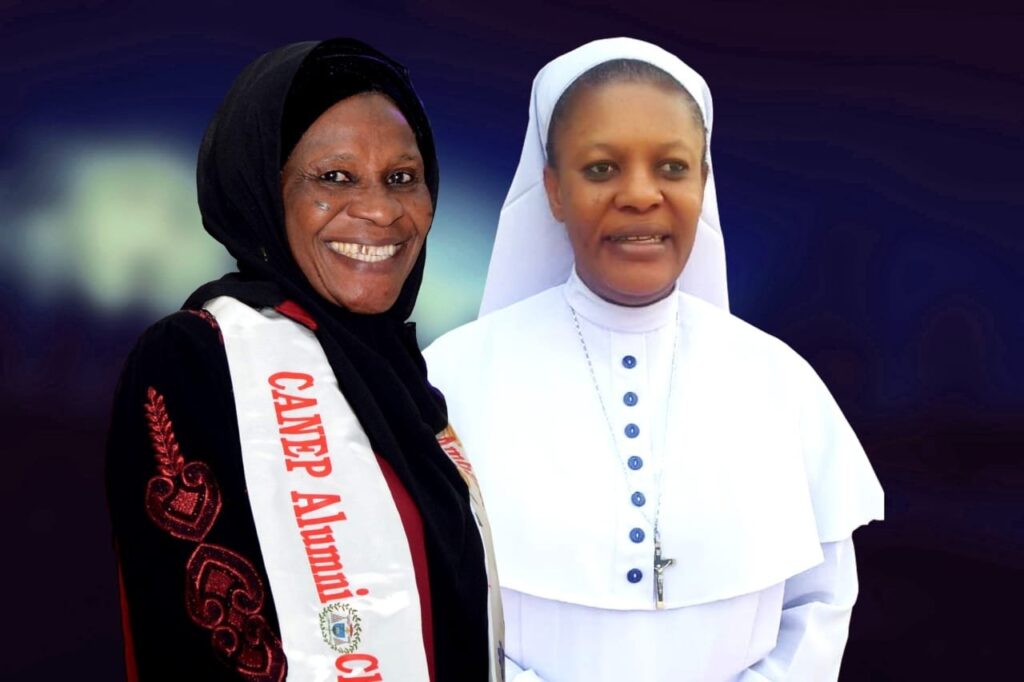ABUJA, Nigeria (OSV News) — While religion was not originally an issue linked to conflicts in the country, deeply rooted religious hostility has in recent decades created a divide between Christians and Muslims in Nigeria, Africa’s most populous nation.
Now, when the state of religious freedom in the country is called “abysmal,” an interreligious duo is working together to make a push for religious tolerance.
“It’s not a Christian and Muslim conflict but a group which feels the way others are practicing religion isn’t the right way,” Sister Agatha Chikelue said.
Sister Agatha is a Nigerian Catholic woman religious from the Congregation of Daughters of Mary Mother of Mercy. Along with her counterpart, Alhaja Bola Usman, a Muslim woman who is a retired Nigerian Customs officer, they are building a movement of women of faith to stand up against violence and to search for peaceful coexistence in their country — Nigeria Women of Faith Peacebuilding Network.
The duo started their efforts in 2008, just one year before the insurrection by Boko Haram terrorists in the northeast region of Nigeria. In 2012, Sister Agatha and Usman institutionalized the network.
The terrorist group has since targeted and killed Christians. In 2014, the group abducted 276 students from a girls’ school in Chibok, and nine years later, 98 girls are still being held by Boko Haram. Other groups such as Fulani herdsmen are violently targeting Christian communities, killing people and forcing them from their villages.
The security situation has further been complicated by other militia groups targeting Christians. In the most recent gruesome news from the country, a Catholic novice of the Benedictine monastery in Nigeria’s northern Iruku Kwara State, Brother Mark Onyekachi Godwin Eze was abducted and killed by his kidnappers, and his body was thrown into the river. He was buried Nov. 22. Terrorism and persecution of Christians are constantly a great concern for Nigerian citizens.
A new report released by Open Doors, an international network monitoring global Christian persecution, said that more than 360 million Christians suffer high levels of persecution and discrimination for their faith in countries across the world.
No fewer than 5,621 Christians were killed for their faith last year. Ninety percent of these were from Nigeria alone, with the country’s levels of violence toward Christians marked as “extreme” by Open Doors.
“The jihadist movement, which seeks to expand Sharia (law) across the continent, has forced Christians into constant motion, from their homes to displacement camps, or to other countries,” Open Doors said.
“The insecurity stemming from this experience of forced displacement makes Christians even more vulnerable to further violence. Christian women, in particular, can be easily targeted for sexual attack, while men are more likely to lose their lives,” the organization added.
Nigeria is about equally divided: a little more than half the country’s 225 million people are Muslim, a little fewer than half are Christian.
Sister Agatha, who has read the Quran and has made many Muslim friends, told OSV News she doesn’t see the terrorist sect as a force but as misguided fanatics. “It’s a fallacy that doesn’t exist anywhere in the Quran, when you kill one person unjustly; it’s as if you have killed the whole nation.”
She added that the holy book of Muslims states that “even if you kill mistakenly, you’ll have to do a lot of atonement.”
Born in the eastern part of Nigeria into a family of six in 1973 in Anambra, in the southeastern region of Nigeria, Sister Agatha is the director secretary of the Interreligious Dialogue Office of the Archdiocese of Abuja and co-chair of the Nigeria Women of Faith Peacebuilding Network.
The activity of the network focuses on bringing Muslim and Christian women together to tackle issues tied to interreligious conflicts and domestic violence against women — two topics that are deeply woven into the fabric of the northern region.
“When we started … there were challenges; it was more difficult to get Christian women than Muslims. Eventually, when we all came together, it was more like an eye-opener,” Sister Agatha said.
Over time, she said, “we discussed issues that were affecting us as Nigerians; we discussed issues of social injustices, bad governance, economic breakdown, insecurity, abuse and misuse of religion. Gradually, these women began to trust us; the wall of fear began to collapse.”
The interfaith network organizes annual fellowship programs on interreligious dialogue and mediation to build the capacities of religious leaders to become peace builders in their respective communities and also mediate and dialogue for peace during conflicts with all representatives of different religious organizations in Nigeria.
The network also offers training in bread making, fashion design and other activities to make women come together and invite coexistence.
Co-founder Usman may be from a different religion, but one thing the 62-year-old grandmother has in common with Sister Agatha is her thirst for humanity.
“Alhaja Bola would wear her hijab and walk into the church. And when they obstruct her at the gate, she won’t get angry or go back, rather she would smile and give me a telephone (call), while I wear my habit, and walk into the mosque with the rosary and Bible,” Sister Agatha said.
“All these happened at the peak of the Boko Haram attacks,” she said.
Usman was educated at St. Bernard Catholic School in southwestern Nigeria. This gave her a vast understanding of the Bible and exposure to how to override negative impressions and perspectives between Muslim and Christians.
She prays the Hail Mary and recites the Angelus, a Catholic devotion commemorating the incarnation. “When I was saying Hail Mary full of grace, Sister Agatha was amazed that a Muslim woman was saying the rosary,” Usman said.
Their work is being supported by the Swiss Embassy and the Cardinal John Onaiyekan Foundation For Peace, an organization working for peace in northern Nigeria.

